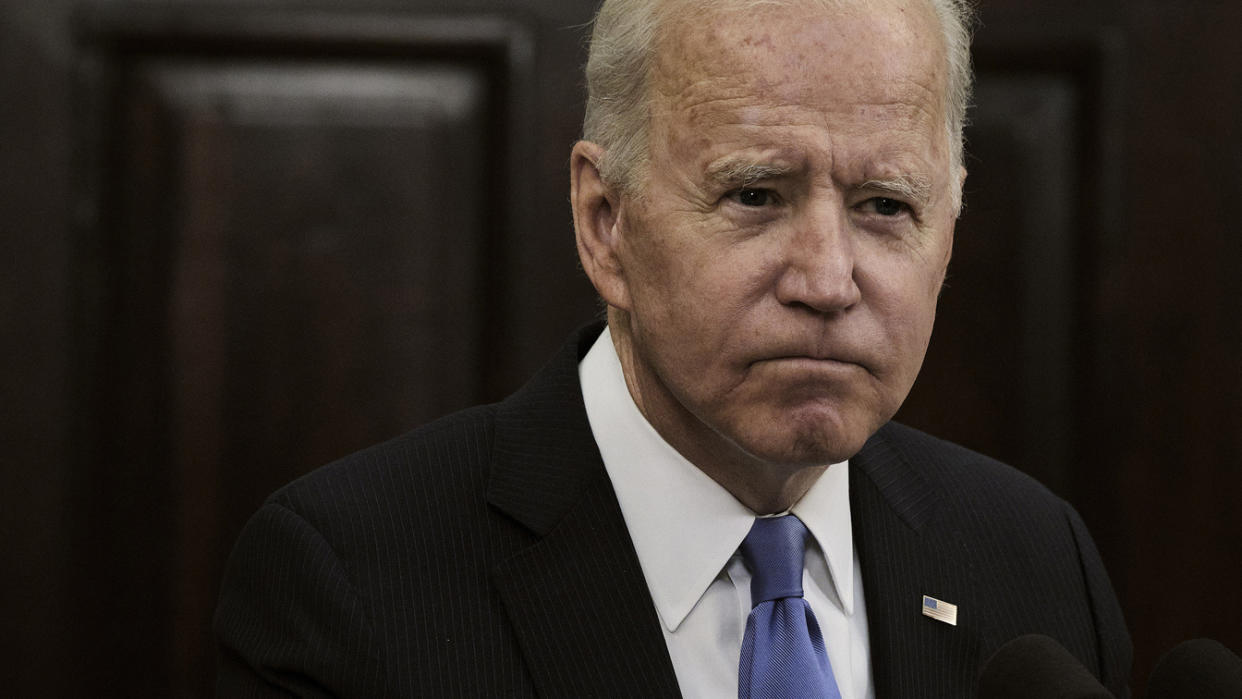Biden's toughest week yet
WASHINGTON — Politics is a form of storytelling, and the story President Biden has been telling about his administration is of challenges overcome and historic progress made. A 63 percent approval rating suggests that Biden’s story is one most American people are willing to hear.
The past week, however, has offered the kinds of plot twists that threaten to undo that narrative. The path to prosperity at home and respect abroad, it turns out, has more than a couple of potholes: threats of war in the Middle East; threats of inflation in the American economy; a ransomware attack on the Colonial Pipeline that caused gas shortages across the Southeast; diminishing prospects for a deal with Republicans on infrastructure; the expulsion by some of those same Republicans of Liz Cheney from House leadership, a sign that Biden will be dealing with the MAGA version of the GOP at least until the 2022 midterms, and probably beyond that.

It was Biden’s toughest week yet, one that suddenly made the comparisons to FDR and LBJ (full disclosure: including by this reporter) seem rather premature. Relishing the scene from Mar-a-Lago, former President Donald Trump offered a historical comparison of his own. “I see that everybody is comparing Joe Biden to Jimmy Carter,” Trump wrote on his new blog. “It would seem to me that is very unfair to Jimmy Carter. Jimmy mishandled crisis after crisis, but Biden has CREATED crisis after crisis.”
After listing the various challenges besetting Biden, Trump concluded that “Jimmy was better!”
It is not exactly true that “everybody” is making the Biden-Carter comparison, but the comparison can also be justified, however narrowly, because the very forces that undid Carter — the Middle East and stagflation — have come back to haunt Biden. The strange photo of last week’s meeting between the Bidens and the Carters probably doesn’t help matters.
Biden can take comfort in the fact that no killer rabbit has come for him. Carter was not so lucky.
Biden’s rough spell began last Friday, when the Bureau of Labor Statistics threw a bucket of ice water on the expectation that April would see 1 million Americans reenter the workforce. It would turn out that the economy added only 266,000 jobs, an alarming discrepancy that caused the unemployment rate to tick up to 6.1 percent.

Republicans said that overly generous unemployment benefits contained in February’s coronavirus relief package were to blame; the president’s aides and supporters said that was hogwash. But then, on Monday, Biden had this to say on the issue: “We’re going to make it clear that anyone collecting unemployment who is offered a suitable job must take the job or lose their unemployment benefits.” Which, of course, had the effect of legitimating the same Republican concerns that Democrats had been saying were absolutely unfounded.
Unemployment is bad. Unemployment coupled with inflation is a disaster, one that is known as stagflation. The last president to preside over an economy of high prices and high unemployment? Let’s just say it was a certain peanut farmer from Georgia.
We are not there, of course, but we are closer than we were, say, a month ago, with rising commodity prices leading to worries that inflation was in the works. Treasury Secretary Janet Yellen has herself voiced concerns that the Federal Reserve may need to raise interest rates to “make sure our economy doesn’t overheat.” She later clarified her remarks, a penance Washington officials often pay for the unforgivable sin of speaking the truth.
Perhaps no images from the Carter years are as potent as those of long lines at gas stations, occasioned by an embargo by oil-producing nations in the Middle East. Similar images played out on television and smartphone screens this week after the ransomware attack on the Colonial Pipeline caused shortages in part of the country.
The Washington Post reported that as people waited to fill their cars at a District of Columbia-area gas station, a heckler offered his thoughts on the situation: “I hope you’re all glad you voted for Biden!”
In some ways, Biden has benefited from the fact that he is not Donald Trump. Effacing unpopular aspects of Trump’s presidency has made him popular. Yet whereas not being Donald Trump has helped Biden in the initial months of his presidency, simply breaking with his predecessor will not suffice in the long run.

A reminder of the unruly reality every president confronts came — as it so often does — from the Middle East, where Israelis and Palestinians are on the cusp of their most significant military confrontation in years. Biden had desperately wanted to stay out of that conflict, yet calls from national security adviser Jake Sullivan to his Israeli counterpart, Meir Ben-Shabbat, have had no discernible impact.
Biden said this week that “Israel has the right to defend itself.” It was a tepid line that didn’t satisfy Washington’s Israel supporters. Nor did it pacify an increasingly emboldened House faction sympathetic to the Palestinian cause. Caught between right and left, the president doesn’t have many options but to hope that the situation resolves itself — never a good bet when it comes to the Middle East.
Similar political dynamics are coalescing on the domestic front, with Biden facing an eager progressive bloc on one side and a hardening Republican opposition on the other. Mitch McConnell, the Republican leader in the Senate, said this week that the “proper price tag” for an infrastructure package was $800 billion. For those counting at home, that’s $1.5 trillion short of what Biden had proposed, and that’s without the $1.8 trillion American Families Plan, which constitutes the second half of the president’s broader vision for fixing the nation’s infrastructure.
McConnell knows perfectly well that the left would never countenance such a pared-down proposal, but he can now claim that he has made a good-faith effort at negotiation with the White House.
Biden can reject that offer outright, as he did when the Republicans offered a much smaller coronavirus relief package in February. Then, as now, he can use a parliamentary trick called budget reconciliation to try to push the bill through the Senate with nary a Republican vote on his side. But that will be more difficult this time around, because centrist Democrats like Joe Manchin and Kyrsten Sinema have both insisted on bipartisanship this time around. And rejecting McConnell’s lowball offer to go with the much higher number favored by progressives will open Biden to charges that he is yet another big-spending Washington liberal.

Whether such accusations are fair or not will be obscured by the fact that they will be attractive to Fox News anchors and their Republican guests, especially if the spending is somehow wasteful — remember Solyndra? — or fails to bring the nation back into full employment.
In the Wall Street Journal, Republican strategist Karl Rove has already complained that “the Biden administration acts as if it has a broad mandate to pursue the most ambitious left-wing agenda in history,” arguing that no such mandate exists.
If the president had at all hoped that the departure of Trump meant the dissolution of Trumpism, such hopes were dashed for good this week when Republicans in the House stripped Rep. Liz Cheney of her leadership position, replacing her with Rep. Elise Stefanik. Cheney had been critical of Trump for what she said was his responsibility for the Jan. 6 riot at the U.S. Capitol; Stefanik, meanwhile, emerged as one of Trump’s most vociferous supporters during his first impeachment trial.
Stefanik’s ascent is a blow to anti-Trump conservatives, which by extension is a blow to Biden. True, the margins in the House are unchanged, which is to say favorable to Democrats. But relentless attacks about socialism and cancel culture could take their toll, especially if no one like Cheney is telling House GOP leader Kevin McCarthy to cool it on the Dr. Seuss front.
None of these developments are fatal to Biden’s agenda, of course, but they aren’t exactly auspicious either. The first three months of his presidency may not have been a honeymoon (it’s hard to honeymoon with a guy who’s been a prominent figure in Washington for four decades), but Biden enjoyed favorable circumstances that, all of a sudden, seem to have come to an end.
At least he doesn’t have to deal with killer rabbits — for now.
____
Read more from Yahoo News:


